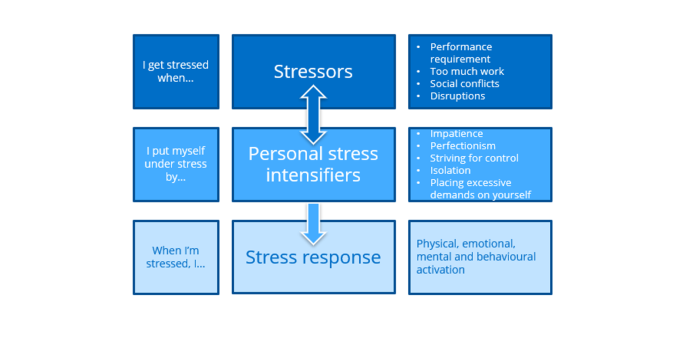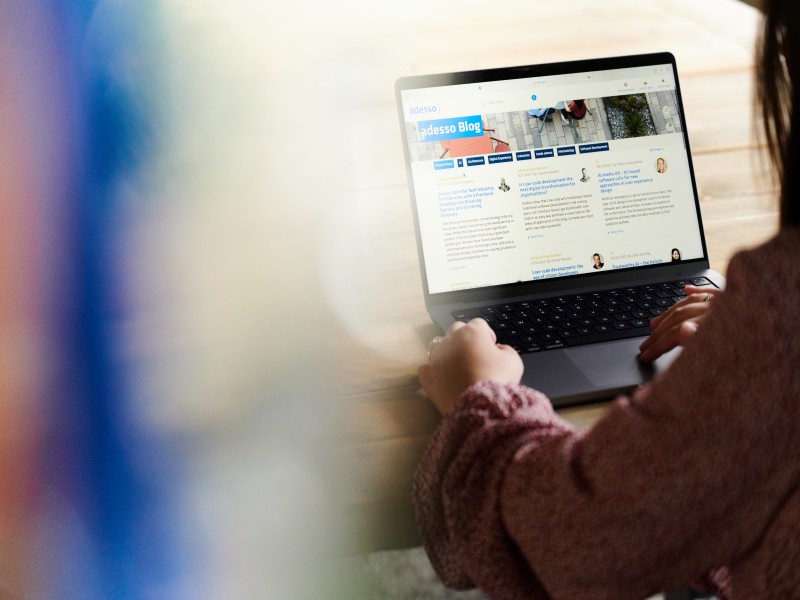27. April 2022 By Magdalena Stern
The relevance of mindfulness in organisations
We’re in a state of flux at the moment – the lines between our professional and personal lives are becoming increasingly blurred, leading to more stress. The workplace has changed – and with it, the demands placed on employees. Constant accessibility, information overload, globalisation, the rapid acceleration brought on by digital media as well as time pressure and competition put strain on employees. These modern demands lead to stress and mental strain in both professional and private contexts. Due to the shortage of skilled workers that has already existed for years, companies are facing an even greater challenge in terms of organisational and human resource development.
Occupational stress and stress prevention methods are very relevant issues these days. Therefore, we often come across the terms ‘mindfulness’ and ‘resilience’ in this context as a result. A mindful lifestyle and an increased level of resilience should lead to a reduction in stress and an improved work-life balance. This is why occupational health management is becoming increasingly important for maintaining, promoting and restoring the safety, health, well-being, working capacity and productivity of employees.
A little theory on the subject of stress
Stress is described as the state of an organism in which their well-being is perceived to be at risk due to an internal or external threat. In occupational psychology, a distinction is made between stress and strain. Stress refers to external factors that affect people, while strain refers to the subjective consequences of a threat. Strain refers to the subjective consequences of stress for an individual. Stress is caused by stressors. However, these stressors aren’t the same for everyone and are perceived and evaluated differently. Stressors don’t necessarily always automatically lead to stress.
There are many different types of stressors. The development of stress is divided into three levels, as illustrated in the following figure. Personal stress intensifiers include personal motives, attitudes and assessments and constitute a link between external factors (stressors) and how we respond to stress.

Stressors are demands whose successful management we assess as subjectively significant yet uncertain. They can come from different sources: the individual, the social environment, the physical-technological environment or also cultural circumstances.
By the way, you can find methods for managing your own stress and implementing a more mindful lifestyle in my previous blog post.
Stress prevention methods in organisations
Occupational stress and stress prevention methods were already occupational health management topics and tasks before the pandemic. Nevertheless, the crisis has contributed to these areas gaining attention. Stress is therefore the imbalance between a person and their environment, and the pandemic has essentially led to an imbalance in the workplace – for example, by introducing remote work or increasing the frequency with which it is done. In general, it can be seen that stress levels in the workplace are significantly increasing and that the impression of exhaustion is becoming more and more widespread. As a part of occupational health management, companies must react to these developments and take measures to maintain the working capacity and productivity of their employees.
The mindfulness-based stress reduction (MBSR) programme – a result of psychotherapeutic research – is currently being used by organisations as a stress prevention method. It boosts concentration and bodily awareness and helps people to better cope with stressful situations and fears. According to Deutsches Ärzteblatt (German Medical Journal), it’s one of the most important new therapeutic concepts of our time. The training, which lasts about eight weeks, is becoming increasingly popular and is being successfully applied in many companies. This shows that implementing mindfulness training in occupational health promotion programmes is a relevant method for strengthening employees’ psychological resilience.
However, due to constantly changing environmental and working conditions, it’s important to stay up to date about matters concerning occupational health promotion. Researchers in the field of occupational stress are constantly delivering new findings, and they make it clear that it’s not enough to simply rely on appropriate training programmes in order to effectively prevent stress-related health risks in the workplace. Moreover, additional structural measures that aim to design work tasks in a way that promotes health are required at the organisational level.
adesso MIND – the mindfulness programme
adesso designed and began the adesso MIND programme in 2021. The programme is a combination of methods, tools and training sessions taken from mindfulness-based stress reduction (MBSR) therapy and the fields of neuroscience and information technology. The training programme was designed in cooperation with Concadora GmbH and pursues the goal of improving employees’ creative problem-solving skills and their ability to concentrate, as well as strengthening emotionally intelligent relationship building skills. It also systematically and sustainably promotes employees’ health and resilience. The adesso MIND programme is therefore offered for purposes of awareness management and mindfulness training. However, adesso MIND is more than that. The provided support ranges from helpful information and experience reports (for example, in podcasts) to free use of the 7mind meditation app, as well as offers that promote sports and health, all the way to MBSR training courses that last several weeks and further training with external coaches. The goal is to provide every employee with effective tools and an individual approach to becoming more mindful and at peace in everyday life.
Conclusion
Stress levels in the workplace continue to increase, making it even more important for organisations to embrace stress management methods and mindfulness. Providing you employees with training courses on how to recognise and manage stress is a good start, but it isn’t a long-term solution. In order to sustain success and achieve competitive advantages, it’s important to integrate these courses’ teachings into your corporate culture.
Last year at the HR Excellence Awards, adesso MIND was voted among the top three in the categories ‘Benefits and Incentives’ and ‘Well-being’. adesso’s programme is constantly being expanded to meet employees’ needs and demands and increase the general feeling of well-being in the company.
It’s also particularly important in regard to this topic to remove the taboos placed on stress. Stress affects us all. How we show it is what makes all the difference. Some get loud, some withdraw and still others don’t let on at all. Stress does not equal failure, and we should deal with the issue more honestly. Most importantly, we should be more mindful when it comes to organisation and be more empathetic towards each other in order to create a positive corporate culture in which everyone feels comfortable.
Would you like to learn more about adesso MIND? Then check out our website and learn how to consciously deal with complexity in a way that’s goal-oriented, solution-oriented.
By the way, you will find more exciting topics from the adesso world in our latest blog posts.

